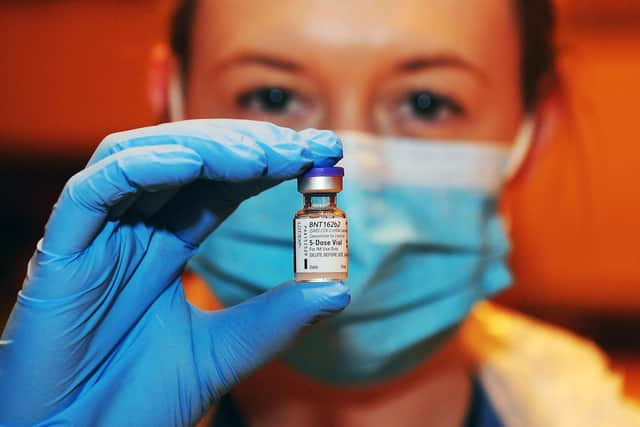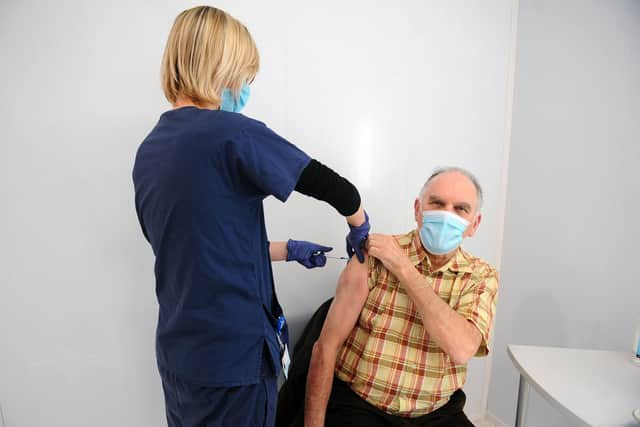COVID in Fife: Vaccination ‘safest bet’ to fight virus says leading doctor
and live on Freeview channel 276
Dr Chris McKenna, NHS Fife medical director, has reinforced the importance of members of the public getting protection from the virus after a challenging festive period saw a rise in the number being hospitalised with the Omicron variant.
A total of 803,000 first, second and third doses have been recorded in the Kingdom, and efforts are now underway to target the five to 11-year-olds deemed to be at high risk.
Advertisement
Hide AdAdvertisement
Hide AdGiving a first hand account of his experiences with COVID patients, Dr McKenna said there could be no doubt the vaccine has prevented deaths and more serious illness - and urged everyone currently unvaccinated to think again.


“In terms of patients who come to hospital with COVID having not had the vaccine, I would say that the numbers are smaller than they were but of course the severity of illness that the people experience is higher than if they had had the vaccine so therefore the treatments and care required is higher,” he explained.
“What I would say is, we don’t know what the future of COVID will bring and this Omicron wave we’ve been through appears - although data is still to be published - to have been a milder illness, even for those who have not been vaccinated.
“But that doesn’t mean it will stay the same in future. It could have swung the other way.


Advertisement
Hide AdAdvertisement
Hide Ad“Perhaps there was a little bit of luck in what has happened, as well as good planning. For now, all I can say is that the vaccine is the safest bet in terms of treatment for COVID.
“We have other treatments and those are medications we can give to minimise the illness for those at high risk, but by and large the best and widest available treatment for COVID would be to be fully vaccinated and therefore your illness will be far less severe.”
NHS Fife’s board reflected on Tuesday on a hugely successful vaccination campaign over the last few months, with Fife achieving the Scottish Government target of vaccinating 80% of eligible citizens over 18 years of age with their ‘Boosted by the Bells’ drive.
Fife had reached 80.3% uptake - excluding drop-in activity - by Hogmanay which was higher than the national average of 78.1%, and that figure now stands at 83%
Advertisement
Hide AdAdvertisement
Hide AdIt took a huge effort from all involved, and NHS Fife’s board heard how the lower than projected absence numbers among staff over the festive period had helped.
Indeed, NHS Fife managed to increase its vaccination capacity by 70% - achieving an average daily run rate of 3,596 between December 14 and 31, compared with 2,105 a day prior to that.
Dr McKenna added: “I feel that the situation in terms of acute hospitals, and patients presenting to hospital with COVID, has taken a positive turn.
“There was a huge focus around vaccination and getting the population boosted with a third dose of vaccine on that run up towards the festive period and I think we can without a doubt look at the data which talks of the success of that programme in Fife and look at the patients presenting to hospital with COVID, and we can see the absolute impact of the success of what we were able to do.
Advertisement
Hide AdAdvertisement
Hide Ad“People did still come into hospital with COVID but we were certainly seeing a different pattern of illness in those who had been vaccinated.
“Indeed, some people come into hospital with other conditions and test positive for COVID who will be included in the overall numbers, but sometimes they had very little or no symptoms at all.
“Other patients do have symptoms but they’re much milder, and we’re seeing a quicker turnaround in terms of their recovery and discharge from hospital.
“Unfortunately, we’re seeing patients with severe illness and they are almost always patients who have not received the vaccination.
Advertisement
Hide AdAdvertisement
Hide Ad“Thankfully we do have treatments to treat those patients and moderate the illness, but the message is always the same: the best treatment for COVID is really to receive the vaccine in due course because the impact on the illness and the severity of illness is really significant.
“We’ve seen evidence of that over the course of January and I hope that we would be past the worst of any acute admissions to hospital.
“We’ve had a challenging few weeks, particularly over the New Year period, but one would hope for an improving pattern going forward.”
